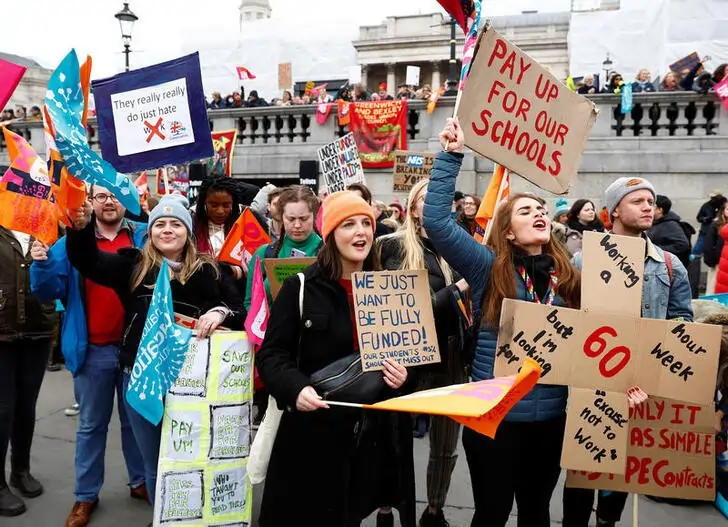
Strong pay growth in UK spreads to public sector, survey shows
LONDON (Reuters) – Strong pay growth in Britain’s private sector will be matched in the public sector in the year ahead, according to a survey which showed no sign of an easing of inflationary heat in the jobs market.
The Chartered Institute of Personnel and Development (CIPD) said employers in the private and public sectors both planned 5% pay rises, meaning public workers were on course for their biggest pay rise since CIPD began its surveys in 2012.
The Sept. 18-Oct. 8 survey of 2,000 employers took place after Prime Minister Rishi Sunak offered a pay rise of more than 6% to teachers, doctors and other public workers in July.
The Bank of England expects wage growth of 4.25% next year, a big part of its decision to keep interest rates at a 15-year high of 5.25% despite a fall in headline inflation and signs of stagnation in the economy.
The CIPD survey showed 51% of public-sector employers reported hard-to-fill vacancies compared to 38% of private-sector employers.
Overall redundancy intentions fell for the first time in nearly two years with 17% of employers expecting to make some redundancies in late 2023.
“The post-pandemic economy has been characterised by high vacancies and dwindling candidate supply and this dynamic continues,” CIPD senior labour market economist Jon Boys said.
“There remains strong demand for people, particularly in the public sector. It’s no surprise therefore that employers are expecting pay increases to match that of the private sector to remain competitive.”
The survey also showed that a quarter of organisations with hard-to-fill vacancies planned to introduce or increase automation, almost twice the level of mid-2022.
Official data due on Tuesday is likely to underscore the BoE’s dilemma with employment numbers set to fall but wage growth still stuck close to record highs, according to economists polled by Reuters.
(Reporting by William Schomberg, editing by Andy Bruce)
LONDON (Reuters) – Strong pay growth in Britain’s private sector will be matched in the public sector in the year ahead, according to a survey which showed no sign of an easing of inflationary heat in the jobs market.
The Chartered Institute of Personnel and Development (CIPD) said employers in the private and public sectors both planned 5% pay rises, meaning public workers were on course for their biggest pay rise since CIPD began its surveys in 2012.
The Sept. 18-Oct. 8 survey of 2,000 employers took place after Prime Minister Rishi Sunak offered a pay rise of more than 6% to teachers, doctors and other public workers in July.
The Bank of England expects wage growth of 4.25% next year, a big part of its decision to keep interest rates at a 15-year high of 5.25% despite a fall in headline inflation and signs of stagnation in the economy.
The CIPD survey showed 51% of public-sector employers reported hard-to-fill vacancies compared to 38% of private-sector employers.
Overall redundancy intentions fell for the first time in nearly two years with 17% of employers expecting to make some redundancies in late 2023.
“The post-pandemic economy has been characterised by high vacancies and dwindling candidate supply and this dynamic continues,” CIPD senior labour market economist Jon Boys said.
“There remains strong demand for people, particularly in the public sector. It’s no surprise therefore that employers are expecting pay increases to match that of the private sector to remain competitive.”
The survey also showed that a quarter of organisations with hard-to-fill vacancies planned to introduce or increase automation, almost twice the level of mid-2022.
Official data due on Tuesday is likely to underscore the BoE’s dilemma with employment numbers set to fall but wage growth still stuck close to record highs, according to economists polled by Reuters.
(Reporting by William Schomberg, editing by Andy Bruce)


